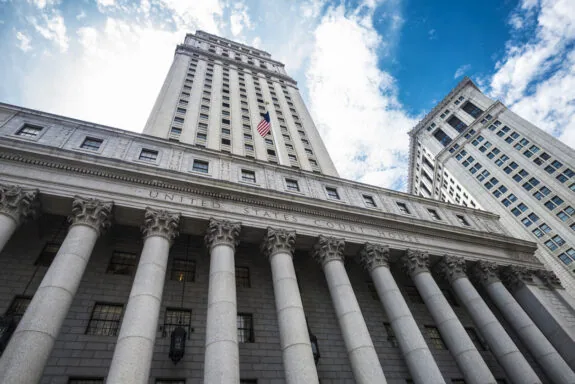Why Choose Us?
Federal conspiracy allegations move fast, involve multiple agencies, and can expose you to serious penalties even when no crime was committed. Clients trust Fast Law for precise legal analysis, strategic defense planning, and guidance rooted in former prosecution experience.
- 5-Star Client Satisfaction
- Over 25 Federal and State Trials Led to Verdict
- Strategic Defense for Complex Federal Conspiracy Allegations
- Immediate Case Assessment and Fast Legal Action
- FREE and Confidential Consultations
What Is Considered Federal Conspiracy?
Federal conspiracy under 18 U.S.C. § 371 occurs when two or more individuals agree to commit a federal offense or defraud the United States. The crime is complete once an overt act is taken in furtherance of the agreement. No completed offense is required, and even limited involvement may expose someone to federal charges. Key elements include:
- Agreement: A shared understanding to commit an unlawful act
- Intent: Knowledge that the agreement involved unlawful conduct
- Overt act: Any action taken to move the conspiracy forward
Federal agents often rely on emails, texts, financial records, and recorded conversations to support these elements.
How Does the Federal Conspiracy Statute Work?
The federal conspiracy statute is intentionally broad, allowing prosecutors to pursue individuals across a wide range of offenses. Courts routinely interpret the statute in a way that gives the government significant charging power.
This statute applies to:
- Drug trafficking conspiracies
- Fraud, bribery, and other white collar offenses
- Racketeering-related conduct
- Terrorism and national security matters
- Counterfeiting and interstate commerce violations
The government may pursue charges even if:
- The defendant played a minor role
- The planned offense never occurred
- Co-conspirators were acquitted or never charged
Penalties for a Federal Conspiracy Conviction in New York
Federal conspiracy penalties depend on the underlying offense. If the conspiracy involves a felony, the sentence can mirror the penalty for the target crime. Even misdemeanor conspiracies can result in jail time and substantial fines. Common penalties include:
- Felony conspiracy: Up to the same maximum sentence as the underlying offense
- Misdemeanor conspiracy: Up to 12 months in prison and fines
- Restitution orders: Repayment to alleged victims
- Sentencing enhancements: Based on role in the offense or alleged financial loss
Statute of Limitations:
Typically up to 5 years, but extended for certain offenses or ongoing conspiracies. Timing is crucial in building a defense strategy.
How Do Federal Investigators Build Conspiracy Cases?
Federal conspiracy charges are often built using long-term investigations involving multiple agencies. Agencies collect evidence over months or years before filing charges.
Investigators may rely on:
- Undercover agents or confidential informants
- Recorded conversations
- Emails, text messages, and social media communications
- Financial transactions and bank records
- Surveillance and electronic monitoring
Because evidence is broad and often circumstantial, strong defense strategies can target weaknesses in how investigators interpret communication or intent.
Common Defenses Against Federal Conspiracy Charges
Defending conspiracy charges requires challenging the government’s ability to prove agreement, intent, or participation. Weakening any element can significantly reduce or dismiss charges. Key defense strategies include:
- Lack of agreement: No genuine shared plan or meeting of the minds
- Lack of intent: Defendant did not knowingly join an unlawful agreement
- Withdrawal: Clear steps taken to leave the conspiracy before the overt act
- Entrapment: Law enforcement-induced conduct that would not have occurred otherwise
- Insufficient evidence: Government relies on assumptions or weak circumstantial proof
Each case requires a strategy tailored to the specific alleged agreement and evidence.
How Fast Law Helps Clients Facing Federal Conspiracy Charges
Fast Law provides strategic guidance from the earliest stages of investigation through trial. Our former prosecution experience allows us to anticipate government strategies and counter them effectively. We assist clients by providing:
- Immediate legal guidance when contacted by investigators
- Thorough review of communications, financial records, and digital evidence
- Strategic use of motions to suppress or exclude improper evidence
- Negotiation aimed at reducing exposure to serious penalties
- Strong courtroom advocacy when cases proceed to trial
Conspiracy charges often implicate multiple defendants. We ensure your rights and interests remain protected at every stage.
What Should You Do If You Are Under Investigation or Charged?
Acting quickly can significantly improve the outcome of your case. Investigators often approach individuals before charges are filed, hoping they will make statements that strengthen the government’s case. Critical steps to protect yourself:
- Remain silent: Do not speak with federal agents without legal counsel.
- Contact a defense attorney immediately: Early legal intervention is essential.
- Preserve evidence: Save emails, texts, logs, and documents connected to the allegations.
- Avoid discussing the case: Conversations with friends, family, or coworkers may be used as evidence.
- Prepare for possible contact from investigators: We will guide you on how to respond safely.
Learn the Process After an Arrest
- What to Know After You’re Arrested
- What Happens at a Bail/Bond Hearing
- Guide to Preliminary Hearings
- Understanding the Pre-Trial Process
- What to Expect at an Arraignment
Facing Federal Conspiracy Charges in New York? Contact Fast Law
Federal conspiracy cases involve complex legal issues and severe potential penalties. Whether you are under investigation or have already been charged, fast action is essential.
Fast Law provides confidential, strategic, and thorough defense representation for individuals facing federal conspiracy allegations. Contact our team today to begin building a strong defense and protecting your future.
Fast Law is based in Manhattan and proudly serves clients across New York, including Brooklyn, Manhattan, Queens, Nassau County, Suffolk County, and New Jersey.

